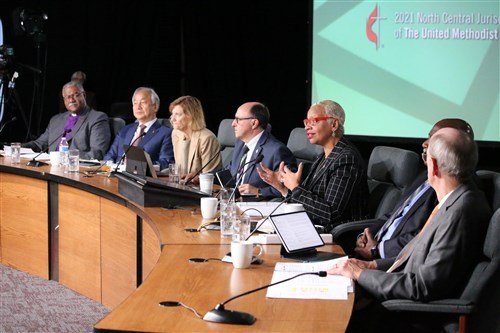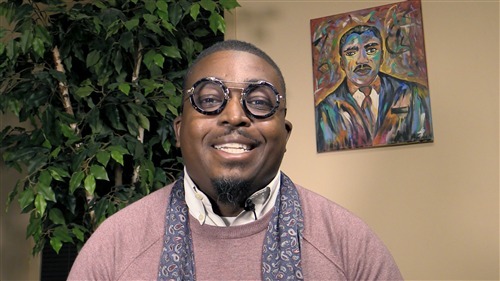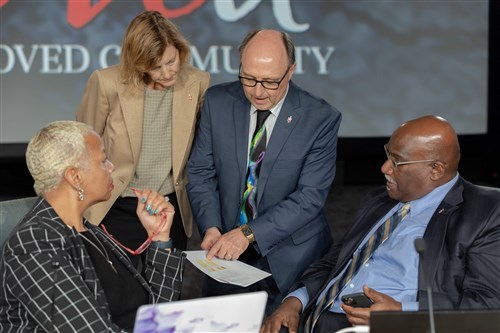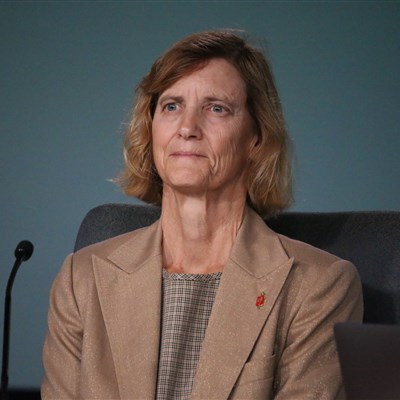
NCJ delegates talk anti-racism and future, vote to reduce bishops by 1

North Central Jurisdiction bishops presided over the gathering. Photos by Rick Wolcott.
When Rev. Ron Bell was in high school, his father became superintendent of the Eastern District of the Delaware Annual Conference. As their family was moving into the superintendents’ big, beautiful parsonage in Eastern Maryland, the entire local police department surrounded the house with guns drawn and told Bell and his father to get on the ground with their hands behind their heads. Why?
“Because a little white girl across the street saw black folk in her neighborhood,” said Bell, who serves Camphor Memorial UMC in St. Paul, Minnesota. “That's when I knew race matters.”
Bell was among six “truthtellers” who shared their personal experiences with race at a virtual North Central Jurisdictional (NCJ) gathering that took place Wednesday and Thursday.
Approximately 250 delegatesparticipated in the official Zoom meeting, and others from across the 10-conference jurisdiction watched it live online. Delegates spent the majority of their time together on three big topics of conversation—dismantling racism, the future of episcopal leadership, and the future of The United Methodist Church.
On Thursday, they voted 135-32 in favor of a document that summed up the conversations and hopes moving forward. A “Covenant to Build Beloved Community,” written using United Methodist baptismal vows as a framework, was developed by a six-person writing team determined by the heads of the NCJ delegations. Kara Togel, Dakotas Conference lay delegate was part of the writing team. Read the covenant statement here.
Dismantling racism
In the dismantling racism portion of the session, retired Bishop Hope Morgan Ward reminded attendees thatthe ministry of anti-racism centers in discipleship.

Rev. Ron Bell was among six “truth-tellers†who shared their personal experiences with race at the virtual North Central Jurisdictional (NCJ) gathering.
“The arc of history bends toward justice, and we will be forceful in pulling that arc down together, all to the glory of God,” she said. She noted that the Council of Bishops has centered the ministries of equity, inclusion, justice, diversity, and antiracism—and in doing so, has appreciated the work of Brian Stevenson, founder of the Equal Justice Initiative in Montgomery, Alabama, and chief creator of the National Memorial for Peace and Justice. He urges four pillars for anti-racism efforts:
- Hear and share true stories; in particular, give space to and honor stories of people of color.
- Get “proximate” to the suffering and pain of racism and inequality.
- Expect resistance.
- Protect your hopefulness.
Rev. Rebecca Trefz, Dakotas Conference clergy delegate, said, “I was really challenged and encouraged by the call for “proximity.” It’s so easy to stay in our own circles of “sameness”—people who are “like us” socially, racially, economically, politically, etc. But these conversations made me wrestle with, ‘how do I break out of my default and become intentional about developing other relationships? And how do I encourage others to do the same?’
After hearing from Ward, the six truthtellers each issued a challenge to the North Central Jurisdiction and the Church.
“Justice takes more than just words; it requires sacrifice,” said Andres De Arco, National Assistant Director to the United Methodist Hispanic Youth Leadership Academy and a member of the West Ohio Conference. “What are you willing to sacrifice for justice?”
The dismantling racism session ended with small group discussions among delegates. They reflected aloud on a question posed by Bishop Tracy Smith Malone, resident bishop of the East Ohio Area: As you think about your context and your discipleship journey and life in Christ, how might God be calling you to make a difference, to step out more boldly and prophetically…to put your weight on the arc of history, bending toward justice?
Dakotas Conference lay delegates Beata Ferris and Kara Togel, shared that leaning into discomfort and context are part of the effort to dismantling racism.
“Talking about race and racism is never easy, especially in a small group that you were randomly assigned to at a conference. It can easily become uncomfortable and nerve-wracking when you don't know where other people are on their own journey of dismantling racism or what others are hoping to gain from the conversation,” said Togel. “In the conversation, I learned so much about the importance of these uncomfortable, hard conversations. They truly are the starting point that move us toward a deeper understanding of one another.”
Ferris shares that partnering with our Native American siblings in ministry is a critical step in our context. “I know we have many congregations in the Dakotas with a heart for mission, but only a few who effectively partner with and serve alongside our Native American siblings. We look to those congregations who are building partnerships as models of how to re-think our missions and turn them into partner ministries.”
The future of episcopal leadership

Bishops of the North Central Jurisdiction gather for discussion.
Delegates on Thursday voted 142-13 in favor of a proposal to have eight active bishops in the NCJ as of the next regular session of the jurisdictional conference—representing a decrease from the nine bishops who have led the jurisdiction in recent years.
In a presentation before the vote, Rev. Sara Isabel, chair of the NCJ Committee on the Episcopacy and a member of the Illinois Great Rivers Conference, explained that if a jurisdiction falls below a certain threshold in membership, the General Conference makes a decision about the number of bishops needed for that smaller number of members. Although the General Conference has not yet met to vote on a reduction, for several years, the NCJ has been below the number needed to secure nine bishops—so such a vote is expected at the postponed 2020 General Conference, now slated for Aug.-Sept. 2022. The NCJ could vote to stay with nine bishops, but then it must figure out how to pay them, apart from the Episcopal Fund that typically covers this cost.
Isbell also pointed out that we’ve had an opportunity over the past year to practice operating with eight bishops. Since Jan. 1, Bishop David Bard has been serving Minnesota on an interim basis in addition to being resident bishop for the Michigan Conference, Bishop Laurie Haller has been serving the Dakotas on an interim basis in addition to being resident bishop for Iowa, and Bishop John Hopkins left retirement to lead the Northern Illinois Conference.
Before the vote, delegates met in small groups to explore a variety of questions around episcopal leadership.
Changes in episcopal leadership is not new to the Dakotas Conference. In 2012, the Dakotas and Minnesota Episcopal Areas were combined and became the Dakotas-Minnesota Area.
“I don’t love the idea of less leadership during this season of the UMC. It seems that we need more leadership, not less. But need more leadership, not less,” said Ferris. “But we also need to be fiscally responsible and good stewards of the resources we have. From our perspective in the Dakotas-Minnesota Area it may not seem like a big deal to ask other Annual Conferences to share a Bishop, as we have been doing it for years and we have found ways to work together in ministry across conference lines.”
Trefz said it is important to remember that we are all called to lead and live out the call to make disciples. “I think it’s important to remember that leadership doesn’t just come from specific positions or roles. We challenge our churches to imagine new leadership models, using the gifts of the WHOLE Body and working collaboratively rather than hierarchically. I think it’s important for us to be stretched to think that way as a denomination as well,” she said.
The future of The United Methodist Church
Drawing on John 6: 1-14, Bishop Laurie Haller told the story of Jesus feeding the 5,000 to close the day on Wednesday. She pointed out that after the meal, Jesus told his disciples to gather up the fragments left over, so that nothing may be lost.

Bishop Laurie Haller.
“My dear friends, I know that you are tired,” said Haller. “We often think somebody else will gather the fragments of our beloved UMC and transform the world. But now it’s time for us to do something in the North Central Jurisdiction. The future of The United Methodist Church is in our hands, as we gather here to hope, to dream, to share the gospel, and to claim our connectionalism.”
Jesus sends you and me out to gather up the fragments, Haller noted, which are are our mixed loyalties, our stubbornness to forgive, our reluctance to accept those who are different, and our fondness for judging. But the fragments are also the loving words we say, the songs we sing, the money we give, the food we share, and the care we offer to the discarded and battered of this world.
“No matter how many fragments we gather up or give away, the basket will always be filled with God’s love, for the circle is wide, and no one should ever have to stand alone,” she said. “That my friends, is beloved community. That, my friends, is our vision. That, my friends, is the future of our church. It’s time for us to do something right now.”
Delegates spent time in breakout groups to discuss what they see as priorities for the NCJ going forward and what the NCJ should accomplish in the next two to five years to fulfill these priorities.
“It's been a hard 32 months, but I have to say I left this meeting full of hope. I walked away with a sense of calm that I have not felt before, and I know others are feeling the same way,” Togel said. “My personal hope is that we can continue this sense of calm among the NCJ and within our local churches. That we hold ourselves accountable to the covenant we adopted and remember our baptism when we do acts of Justice and anti-racism work.”